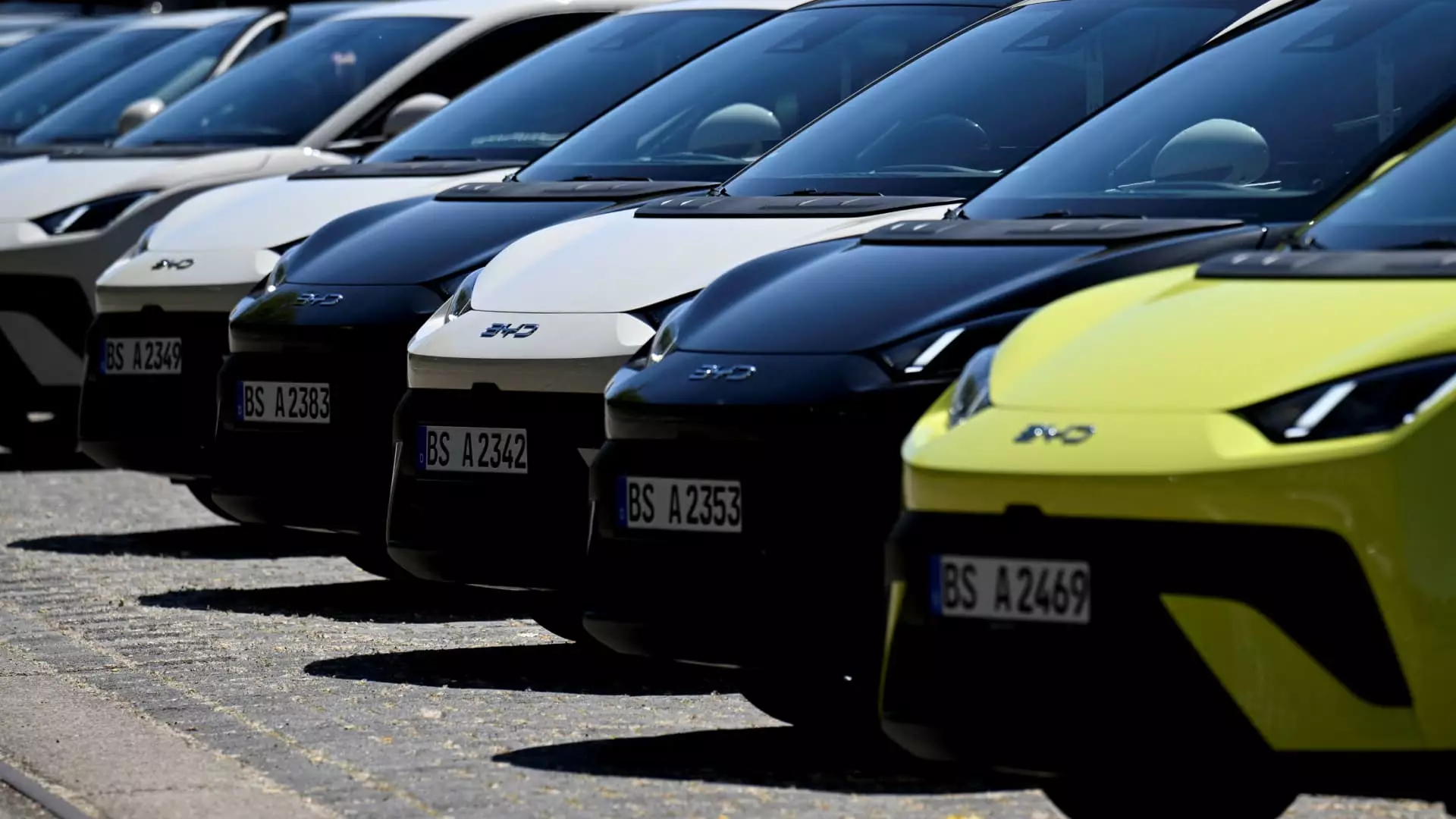China’s electric vehicle (EV) market, a once unassailable bastion of innovation and growth, now finds itself embroiled in a fierce and potentially destructive price war. As major players slash prices to capture market share amidst waning demand, the ramifications of this battle extend beyond individual companies; they threaten the very fabric of an industry that was once poised for sustainable expansion.
Tesla’s latest sales figures reveal a staggering 15% decline in China from the previous year, a stark warning to those who believed the electric revolution would be unstoppable. Meanwhile, BYD, the self-proclaimed king of China’s EV market, finds its own sales growth decelerating; despite a 14% increase year-on-year, it’s evident that sustaining such momentum requires drastic measures. Sharp price cuts and competitive offers are becoming the norm, not just for BYD but for its rivals as well. Analysts are thus predicting an influx of aggressive pricing strategies in the upcoming weeks, powering an endless cycle of discounts that undermines the stability of the market.
The Appealing Case for Geely
In this high-stakes arena, Geely emerges as a compelling contender. Analysts from CLSA have highlighted Geely’s balanced approach towards internal structure and market competition. Geely’s electric brands—Galaxy, Zeekr, and Lynk & Co.—leverage shared technologies to create a robust product lineup that directly challenges BYD’s offerings. With a price target predicting a 28% upside, Geely appears well-positioned to face the adversities of price wars, citing not only competitive pricing but also superior specifications of some of its models.
Interestingly, this positioning raises questions about the broader implications: Is Geely not just competing for sales but also setting itself up as a long-term market player? If it can sustain quality while keeping prices competitive, Geely might not only weather the storm but emerge as a leader by virtue of adaptability. By exploiting gaps left by market saturation and aligning production capabilities with shifting consumer demands, Geely seems to be playing chess while others are playing checkers.
Xpeng: A Startup Set for Growth
Meanwhile, Xpeng is amassing traction that cannot be overlooked. With deliveries exceeding 30,000 cars for seven consecutive months, Xpeng is transforming itself from a scrappy newcomer into a formidable player in the global EV race. Analysts project a bullish price target based on the strength of its advanced driver-assist technologies and brand new models, indicating that the company is gearing up to seize larger segments of market share in the near future.
What sets Xpeng apart is its emphasis on innovation rather than merely competing on price. In times of escalating competition, companies that display distinctive technological advantages often resonate more with consumers. Xpeng’s ambitions to target efficiency and experience signal a redirection from a purely pricing-focused strategy.
The Reality Check for Established Giants: BYD’s Challenges
On the other hand, BYD, the previous stronghold of the market, is feeling the heat of a pressure cooker that it cannot simply regulate with discounts. The company’s over-reliance on pricing strategies could lead to brand devaluation if it fails to pivot toward emphasizing innovation or premium features. Analysts still sing praises for BYD, particularly its expansion into foreign markets and premium segments; however, their optimism seems somewhat misplaced amidst a tumultuous local market. If the company cannot balance growth with price integrity, it could risk losing its coveted status.
What makes this scenario compelling is the dichotomy of strategy within the industry. While some companies try to compete on price, others, like Xpeng and Geely, are fostering sustainable differentiation through technology and quality. The prospect of a future dominated by an array of choices between premium offerings and budget-friendly options is becoming increasingly real.
Surviving the Onslaught: Leapmotor and Li Auto
In the midst of such an aggressive landscape, players like Leapmotor and Li Auto have shown resilience. Both companies have reported stable sales in a month characterized by volatility, with Leapmotor carving a niche through a cost-effective product range and Li Auto maintaining profitability even as sales fluctuate. The latter’s strategy of offering hybrid models that blend electric efficiency with traditional fueling methods allows it to bypass some of the unfavorable pricing trends that have ensnared more traditional players.
However, the volatile electro-automotive landscape inevitably leads to questions about the sustainability of such models. Will consumers continue to favor EVs, and will they do so at prices that ensure profitability? These questions linger like a storm cloud overhead, creating an atmosphere ripe for unpredictability.
This ongoing war raises an essential point: are we witnessing a fleeting moment of competition or a profound shift in how we value electric mobility in the long term? As prices plummet and innovations surge, the battle lines have been drawn, and all players must strategize not just for survival, but for dominance in what is rapidly becoming a high-stakes game.

